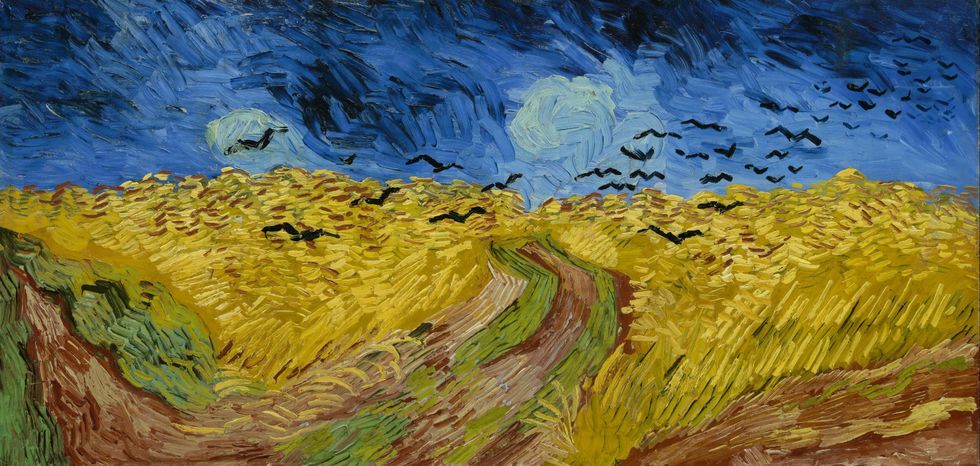It is overly simplistic to say that an artist must suffer greatly in order to produce great work, I must say. (Also, suffering is subjective, and there are many kinds of suffering possible: physical pain, loss of loved ones, witnessing traumatic events, etc.) Besides, not all great works of art are sad. However, it’s undeniable that many artists die young, often due to mental health and addiction problems: there is something sad and difficult to cope with going on in the lives of artists, such as painters, authors and poets. So, although I can’t say suffering causes great works of art, I do see that suffering is related to profound artistic production.
What is an artist?
There are all kinds of artists, but I am fascinated by the work of visual artists: Painting is the art of addition. Sculpture is the art of removal. One is only color, one is only (mostly) form. Writing is flat, but it is particular in its form, especially in poetry. Writing requires addition of language that is colorless to the eye but colorful to the mind. Writing is creation where there once was nothing but a blank sheet, and those written additions must earn the right to stay, and not be erased. Words must be reorganized, reshaped, reduced as much as possible, clearly, but not always outright; there is no less truth in a metaphor than there is in a literal statement. Similarly, there is no less truth in Starry Night for its swirls: sometimes Truth of artwork isn't how it looks, but how it feels, and how it is perceived. (which van Gogh knew, an artist known for his sufferings and suicide). The job of an artist is to convey the experience of human perception... so what does that have to do with suffering?
Suffering:
I can't speak for painters like van Gogh, musicians like Beethoven (who suffered the loss of his hearing) or any sculptors, so the remainder of my point pertains to writers as artists: and as far as I can see, suffering has two main effects on writers. One, suffering makes writers think more about what they believe about life, from what they have seen of it – a question too daunting for some people to face (sometimes too daunting for writers to face any longer, i.e. Sylvia Plath with her suicide by oven, or Hemingway with his excessive drinking. Another writer, Dorothy Parker, famously stated, "I'm not a writer with a drinking problem. I'm a drinker with a writing problem"). In addition to suffering causing writers to think more about what they believe about life, suffering makes writers practice empathy. they must consider the positions of many, multiple people. Writers are interested in sentences, but they’re also interested in how communicating their personal experiences, and hearing about others’. Because they know loneliness, writers want to mitigate the mental and emotional isolation of others. They want to Know and be Known.
Coping:
When anyone suffers, the next step is to cope, which isn't a choice, although coping can be done poorly... a person who suffers (everyone?) needs to cope – and coping can take two forms (both have a time and place where they are appropriate). One form: distractions such as hobbies or addictions. The other form: direct processing through expression (i.e., verbalization). Writing is the latter. I have no doubted that writing helps me cope, even before I knew it was doing so. Writing is a conversation, but the most private conversation possible. People think writing is a monologue, that it is only statements, but that’s wrong; a person is always conversing with him/herself in their work, asking questions, exclaiming contradictions (and meaning both of them), etc.
Malpractice of Coping:
However, like I said, both distraction and direct processing have a right time and place. Too much distraction is avoidance. The seething, festering mess of unfaced emotions that results from avoidance is no healthier than the emotional load caused by excessive consideration of the painful problem: brooding over emotions and experiences and cultivating undue nostalgia hamper one's ability to move on. Those continual mental visits/revisions can become torturous: thus, the tortured artist. Which is viewed much more romantically than it must be in its practice.
Writing about suffering may help expel difficult thoughts and feelings, but it can also make those thoughts and feelings cyclical. Perhaps the creation of great artwork has less to do with the magnitude of suffering, and more to do with the method of coping... and quality artwork has come both from the tortured artist, and the balanced artist, too.
Conclusion
So, really, who knows if great suffering is the cause of great work, but I will not deny there seems to be a correlational relationship in many instances. To play the devil's advocate, maybe the greatest artwork is only possible if a person suffers unspeakable events, giving them an uncommon perspective. But, creation of ‘great’ artwork doesn’t mean that that artwork is an accurate representation of reality, nor does suffering always mean the production of a somber piece of work: artwork can be great without being ultimately unhappy. The question, and the answers to the question of great artists' suffering, are more complex than they first appear.
To end on a concrete note, writing on this topic reminds me of a line by Robert Frost, in one of his journal entries. Many people say that creative work is originality… well, Robert Frost said, “Originality is the Devil. (God was always God. The only new thing is the Devil).” Perhaps he is onto something here… Suffering is suffering is suffering. Writers aren’t saying anything new. They’re saying old truths in new ways, in personal ways. Perpahs this is the same for painters, sculptors, musicians, etc. And suffering just might be one way that reminds artists to come back to the basics, not in an effort to remake them, but to converse with them in personal terms.























